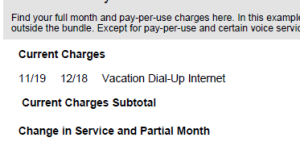Verizon Loses Customer By Charging A ‘Vacation’ Fee To Suspend Service To His Storm-Damaged House Image courtesy of Roy tried to cancel Verizon after seeing this "vacation" fee, but Verizon just couldn't do it.
Like many people in coastal New York, Roy’s house took a huge hit when Hurricane Sandy swept through the area a month ago. When he realized he wouldn’t be living in the house for the foreseeable future and certainly wouldn’t be using that home’s DSL service, he asked Verizon to temporarily suspend service.
It all seemed to be going well at first, Roy tells Consumerist.
“The customer service representative, aware of my address and plight, was most sympathetic and said she would suspend service for six months,” he writes.
But when Roy went online today to check out an unrelated billing issue, he noticed a $9.99 monthly fee labeled “Vacation Dial-up Internet” that he’d never been told about.
“I called Verizon today thinking there was a mistake and that the charge would be waived,” writes Roy. “But the CSR said no, that was their policy. An account suspension generates a vacation fee. I told her I was not on vacation and I can’t live in the house. She said she herself was in the same situation, but that was still the policy. I told them if I knew about the charges at the time I just would have dropped my account then and there.”
Roy says his requests to escalate the call were denied. So in the end, he just canceled his service entirely. Thus, Verizon got its $9.99 fee — once — and instead lost out on Roy’s business for years to come.
“The real point is, Verizon customers in the disaster area should check their bill to see if they are getting hit with these charges,” writes Roy. “Compared to everything else that Rockaway residents are going through, this is a minor nuisance. Still, it involved a 50-minute phone call, and I will never get those 50 minutes back.”
Roy’s story reminds us of a previous incident involving Comcast and where Kabletown reps told residents of a Tornado-ravaged Michigan town they could suspend their service but that they would be considered “on vacation.” After the media got involved, Comcast realized it had made a mistake. Let’s hope the same happens here.
Want more consumer news? Visit our parent organization, Consumer Reports, for the latest on scams, recalls, and other consumer issues.


